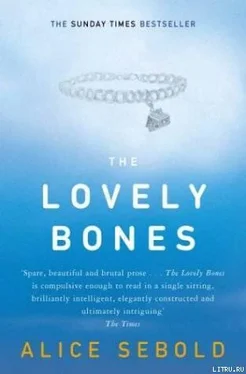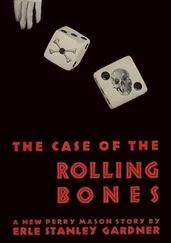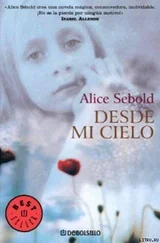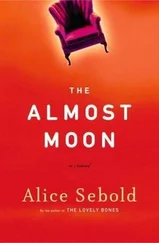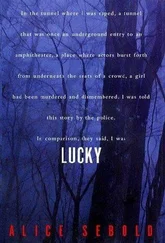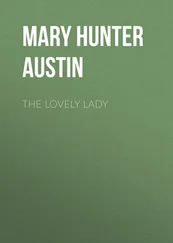At twenty-one Lindsey was many things I would never become, but I barely grieved this list anymore. Still, I roved where she roved. I collected my college diploma and rode on the back of Samuel’s bike, clinging on to him with my arms wrapped around his waist, pressing into his back for warmth…
Okay, it was Lindsey. I realized that. But in watching her I found I could get lost more than with anyone else.
On the night of their graduation from Temple University, she and Samuel rode his bike back to my parents’ house, having promised my father and Grandma Lynn repeatedly that they would not touch the champagne tucked inside the bike’s pannard until they reached the house. “After all, we’re college graduates!” Samuel had said. My father was soft in his trust with Samuel – years had gone by when the boy had done nothing but right by his surviving daughter.
But on the ride back from Philadelphia down Route 30, it began to rain. Lightly at first, small pinpricks flashing into my sister and Samuel at fifty miles per hour. The cool rain hit the hot dry tar of the road and lifted up smells that had been baked in all day under the hot June sun. Lindsey liked to rest her head between Samuel’s shoulder blades and take in the scent of the road and the scrappy shrubs and bushes on either side. She had been remembering how the breeze in the hours before the storm had filled all the white gowns of the graduating seniors as they stood outside Macy Hall. Everyone looked poised, for just a moment, to float away.
Finally, eight miles away from the turnoff that led to our house, the rain grew heavy enough to hurt, and Samuel shouted back to Lindsey that he was going to pull off.
They passed into a slightly more overgrown stretch of road, the kind that existed between two commercial areas and that gradually, by accretion, would be eliminated by another strip mall or auto parts store. The bike wobbled but did not fall on the wet gravel of the shoulder. Samuel used his feet to help brake the bike, then waited, as Hal had taught him, for my sister to get off and step a few feet away before he got off himself.
He opened the visor of his helmet to yell to her. “This is no good,” he said, “I’m going to roll her under those trees.”
Lindsey followed behind him, the sound of rain hushed inside her padded helmet. They picked their way through the gravel and mud, stepping over branches and litter that had gathered at the side of the road. The rain seemed to be getting heavier still, and my sister was glad she had changed out of the dress she’d worn to commencement and into the leather pants and jacket that Hal had insisted on getting her despite her protests that she looked like a pervert.
Samuel wheeled the bike into the stand of oaks close to the road, and Lindsey followed. They had gone the week before to get haircuts at the same barber shop on Market Street, and though Lindsey’s hair was lighter and finer than Samuel’s, the barber had given them identical short, spiky cuts. Within a moment of removing their helmets their hair caught the large drops that filtered through the trees, and Lindsey’s mascara began to bleed. I watched as Samuel used his thumb to wipe the traces from Lindsey’s cheek. “Happy graduation,” he said in the darkness, and stooped to kiss her.
Since their first kiss in our kitchen two weeks after my death, I had known that he was – as my sister and I had giggled with our Barbies or while watching Bobby Sherman on TV – her one and only. Samuel had pressed himself into her need, and the cement between the two of them had begun to set immediately. They had gone to Temple together, side by side. He had hated it and she had pushed him through. She had loved it and this had allowed him to survive.
“Let’s try and find the densest part of this underbrush,” he said.
“What about the bike?”
“Hal will probably have to rescue us when the rain stops.”
“Shit!” Lindsey said.
Samuel laughed and grabbed her hand to start walking. The moment they did, they heard the first thunderclap and Lindsey jumped. He tightened his hold on her. The lightning was in the distance still, and the thunder would grow louder on its heels. She had never felt about it the way I did. It made her jumpy and nervous. She imagined trees split down the middle and houses on fire and dogs cowering in basements throughout the suburbs.
They walked through the underbrush, which was getting soaked despite the trees. Even though it was the middle of the afternoon, it was dark except for Samuel’s safety light. Still they felt the evidence of people. Their boots crunched down on top of tin cans and pushed up against empty bottles. And then, through the thick weeds and darkness both of them saw the broken window panes that ran along the top of an old Victorian house. Samuel shut off the safety light immediately.
“Do you think there’s someone inside?” Lindsey asked.
“It’s dark.”
“It’s spooky.”
They looked at each other, and my sister said what they both were thinking. “It’s dry!”
They held hands in the heavy rain and ran toward the house as fast as they could, trying not to trip or slide in the increasing mud.
As they drew closer, Samuel could make out the steep pitch of the roof and the small wooden cross work that hung down from the gables. Most of the windows on the bottom floor had been covered over with wood, but the front door swung back and forth on its hinges, banging against the plaster wall on the inside. Though part of him wanted to stand outside in the rain and stare up at the eaves and cornices, he rushed into the house with Lindsey. They stood a few feet inside the doorway, shivering and staring out into the pre-suburban forest that surrounded them. Quickly I scanned the rooms of the old house. They were alone. No scary monsters lurked in corners, no wandering men had taken root.
More and more of these undeveloped patches were disappearing, but they, more than anything, had marked my childhood. We lived in one of the first developments to be built on the converted farmland in the area – a development that became the model and inspiration for what now seemed a limitless number – but my imagination had always rested on the stretch of road that had not been filled in with the bright colors of shingles and drainpipes, paved driveways and super-size mailboxes. So too had Samuel’s.
“Wow!” Lindsey said. “How old do you think this is?”
Lindsey’s voice echoed off the walls as if they stood alone in a church.
“Let’s explore,” said Samuel.
The boarded-up windows on the first floor made it hard to see anything, but with the help of Samuel’s safety light they could pick out both a fireplace and the chair rail along the walls.
“Look at the floor,” Samuel said. He knelt down, taking her with him. “Do you see the tongue and groove work? These people had more money than their neighbors.”
Lindsey smiled. Just as Hal cared only for the inner workings of motorcycles, Samuel had become obsessed with carpentry.
He ran his fingers over the floor and had Lindsey do it too. “This is a gorgeous old wreck,” he said.
“Victorian?” Lindsey asked, making her best guess.
“It blows my mind to say this,” Samuel said, “but I think it’s gothic revival. I noticed cross-bracing on the gable trim, so that means it was after 1860.”
“Look,” said Lindsey.
In the center of the floor someone had once, long ago, set a fire.
“And that is a tragedy,” Samuel said.
“Why didn’t they use the fireplace? There’s one in every room.”
But Samuel was busy looking up through the hole the fire had burned into the ceiling, trying to make out the patterns of the woodwork along the window frames.
Читать дальше
